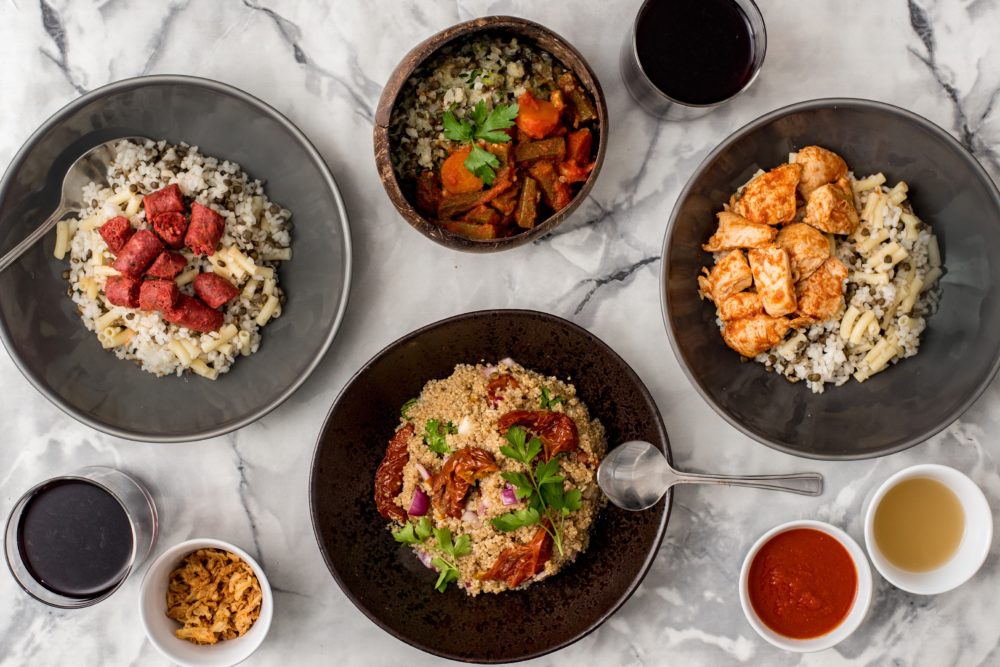Koshary (also spelled koshari) is to Egyptian food as the pyramids are to its culture. Symbolic. Adored. Absolutely delicious.
The dish is widely considered Egypt’s national dish. Rice, lentils, chickpeas and pasta are cooked individually, then tossed together and topped with cumin-scented tomato sauce and crunchy fried onions to create this iconic creation. What makes koshary stand out is that it can fill up the hungriest person alive for just a few Egyptian pounds. This is where Koshary Kitchen comes in.

Ramy Amir at one of London’s food markets — Via Koshary Kitchen
Three years ago, Ramy Amir decided to take our beloved street food to the UK, London to be specific, with Koshary Kitchen. “The entire process was long and hard,” Amir tells me. “It started off while I was studying in university in the UK. I wanted to launch an Egyptian food concept but had to really study it well before taking the leap of faith. This is because London is such a competitive market for food and you truly have to bring your best to be able to have a chance in this market.”
“The beauty about being in London is that you don’t need a restaurant to sell food and build your brand unlike other markets.”
Amir proceeded by writing his dissertation about launching a food business in London and then went on to get the right visa to start operating his business in London. His approach to the project was simple: develop the brand with the least cost structure so it can last. “The beauty about being in London is that you don’t need a restaurant to sell food and build your brand unlike other markets,” Amir says enthusiastically. “The are so many ways that you can bring the food to the market without incurring all the extremely high costs of a restaurant. I rented a loft which got certified as a commercial kitchen in order to operate my food business from it.”

Koshary with meat balls — Via Koshary Kitchen
From that moment, all Amir had to do was develop his menu. After a few attempts, experiments (one of these menus literally only had two items — classic koshary and koshary with meatballs) and visiting aplenty of London food markets in the process, he finally landed on the winning menu that ended up having 19 dishes in total which include three salads and two deserts. “I realized that having two dishes wasn’t enough and that presentation is key,” Amir explains. “The business quickly grew, which lead me to brave up and get a full-on commercial kitchen in Battersea, a district of south west London.”
“They instantly loved it. This is probably because they’ve never tasted anything like it.”
When asked about how the Brits took to koshary, Amir — luckily — had nothing but good words to say. “They instantly loved it. This is probably because they’ve never tasted anything like it. You can see it in their eyes that when they look at the dish, they don’t expect it to taste that delicious. It’s mostly consumed at lunch time in their office or at night in the comfort of their home.”

Koshary with North African sausage — Via Koshary Kitchen
Classic koshary is and will always remain his favorite type of koshary, but when having to pick one from his creations — he opted for the cauliflower rice base with chicken. “The reason being that it’s a healthy take on koshary, yet very tasty.”
Koshary Kitchen have expansion plans in the immediate future and aim to open their second location in the UK by 2019. “We are just focusing on London at the moment, then possibly other places in Europe, then perhaps Cairo eventually,” he hopes.

Ramy Amir in his Koshary Kitchen uniform — Via Koshary Kitchen
Amir is an inspiration to every Arab millennial who wants to go off the beaten path and give it a shot at the entrepreneurial game.
“Believe in yourself and your concept because no one else will. Also make sure that you have perfected your product before you decide to take it to market. In this line of business, there is very little room for error. I believe that you should take your time in creating a great product before deciding to move forward with the project. This is a tough business and you need to have the stomach and drive for it.”




























